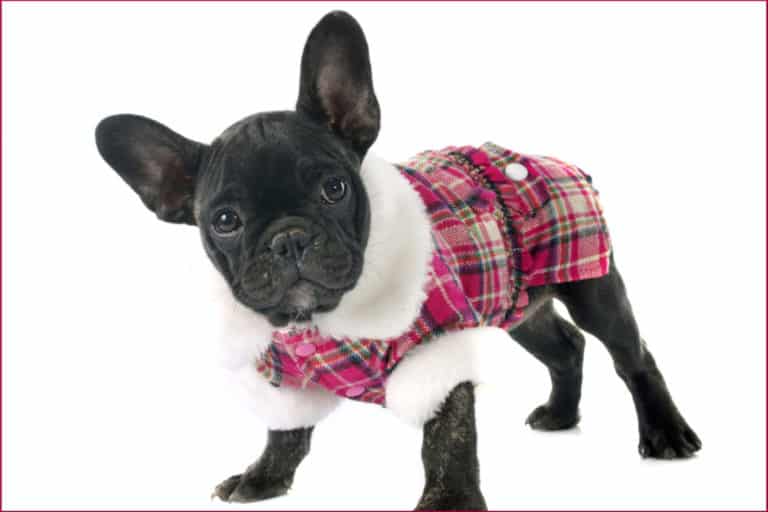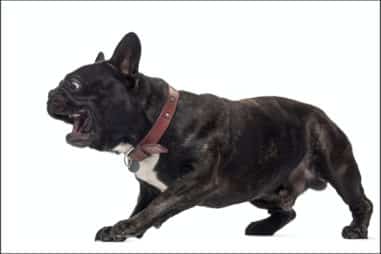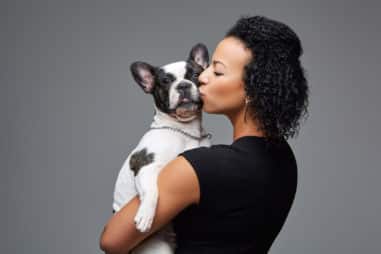Your French Bulldog will love you until they can and all they want in return is your love and attention. Reciprocating their love starts with providing them with necessities. These will help to keep your Frenchie strong and healthy.
With their health and wellbeing taken care of, they will be able to live a long and comfortable life. This means more time for them to love you, and more of them bringing joy into your life.
What Does a French Bulldog Puppy Need?
Apart from food, your Frenchie puppy needs a list of other items that they can use even as adults. But you need to make sure that these essentials are fit for brachycephalic breeds. With food bowls, for example, you need to take their short necks into account.
Picking out your Frenchie’s essentials can be tricky. Don’t worry, though! Below is a guide on what you should get and what works best for your lovable companion.
Nutritious Food
A Frenchie puppy’s diet needs the correct amount of vitamins, minerals, protein, carbohydrates, fat, and fiber. Remember that they have a different dietary need than adults. So you should look for food made for puppies.
The process of choosing one that your Frenchie pup likes takes a lot of trial and error. But whatever you feed them, make sure it has the following:
- High-quality whole protein from poultry and fish
- Moderate fat content (omega-3 fatty acids)
- Moderate calorie content
- Vitamins
- Fruits
These should be at the top of the ingredients list, especially proteins. The first line in an ingredients list lets you know what makes up the bulk of your Frenchie’s food. So the lower an ingredient is on the list, the lesser of it the food has.
Now that you know what to look for in your Frenchie’s food, you should know what to avoid. Steer clear from these ingredients:
- Animal by-products, fillers, or artificial additives
- Toxins: propylene glycol, sodium selenite, and BHA to name a few
- Allergens: grain, wheat, and soy
- “By-products” or “meat-meal” labels
It’s also best to have variety in what they’re eating. You can rotate between kibble, raw food, and wet food.
Each of these has its benefits. And having these on rotation will make sure your Frenchie doesn’t get bored of what they’re eating.
Feeding Bowl
Eating is hard for brachycephalic breeds like the Frenchie. Their short necks and snouts make it tough for them to eat from regular food bowls.
Since they can’t extend their necks like other breeds, it’s tough to reach the bottom of the food bowl. And with their short snouts, they can inhale and choke on their food. This results in bloating and flatulence problems that are uncomfortable for your Frenchie.
And because Frenchies love food, they tend to eat fast. This doesn’t help with the bloating and leaves a mess.
For these reasons, they need a special food bowl. Here are some Frenchie-friendly bowls you can get for your buddy:
- Slow-Feeding Bowls: These have some obstructions in the bowl that’ll help your Frenchie eat slower.
- Slanted Bowls: Perfect for your Frenchie’s short neck. These bowls help to reduce the pressure on their neck as they eat.
Whatever food bowl you go for, it’s best to go for stainless steel instead of plastic.
It’s easy to get scratches on plastic bowls where bacteria can live in. No matter how well you clean them, the bacteria will be hard to remove.
And if your Frenchie is a big chewer, they might chew on a plastic bowl and end up hurting themselves. Especially when they’re going through their teething stage.
Dog Bed
Frenchies are not an active breed and they would prefer to lounge around. A Frenchie puppy sleeps around 18 hours a day, so it’s only right to give them a cozy doggy bed.
There are many dog beds in the market, but which one is the best for your Frenchie? If you’re in the search for one, here are some factors to consider:
- Sleeping Position: Consider how your Frenchie sleeps. Whether they like to sleep curled up or like a frog, there’s a dog bed for that.
- Health Needs: If your Frenchie has joint issues, an orthopedic dog bed can help with the pain.
- Size: Your puppy is still growing, so you may need to buy a couple of beds as they mature to their full-grown size.
Also, Frenchies are not good at regulating their temperature. You may also want to get them a heating and cooling pad. That’ll help them nap in comfort during winter and summertime.
Shampoo
Your Frenchie’s health will reflect on their skin and fur. They have sensitive skin that can cause itching problems. Some shampoos can even be the cause of this.
With the right product, you can avoid this issue. Your Frenchie’s shampoo should be:
- PH Balanced: To avoid stripping off their natural oils. A proper pH balance keeps their skin stay moisturized.
- Hypoallergenic: Many shampoos have irritating ingredients like fragrances, sulfates, and parabens. These can make your Frenchie’s skin itchy.
- Soothing: If your Frenchie has itchy skin, look for shampoos that have aloe and vitamin E.
- Deodorizing: Dogs shouldn’t smell like flowers but they shouldn’t be smelly. Synthetic fragrances can do more harm than good. It’s best to opt for natural fragrances instead.
Grooming Brush or Glove
Despite their short coats, French Bulldogs still need constant brushing. This will improve their fur quality by distributing their natural oils. It’ll also get rid of their dead hair.
Look for needle comb brushes that are firm yet gentle for their skin. You can also use a silicone grooming glove instead. These gloves are more gentle and you can use them every day.
Toys
Getting toys for your French Bulldog has benefits, especially for puppies. Other than keeping them entertained, toys improve your Frenchie’s mental abilities. It also teaches them to spend time alone, which can reduce separation anxiety.
Pet shops have a lot of toys you can buy. But before buying, make sure that they are:
- Non-Toxic: Frenchies love chewing, Low-quality toys may contain harmful and toxic materials.
- Durable: It’ll be easy for your pup to tear through their toys. Small broken pieces are a choking hazard.
- Perfectly Sized: Toys should be small enough that they can bite on. But big enough to avoid your Frenchie choking on them.
- Not Stuffed: Stuffed toys use synthetic stuffing. If your Frenchie breaks it, the stuffing can get stuck in their teeth or throat.
Now that you know where to start, here are Frenchie-friendly toys that you can buy:
- Puzzle Toys
- Slow-Feeding Toys
- Tug Toys
- Fetch Toys
- Distraction Toys
- Chewing Toys
A variety of toys is beneficial for your Frenchie. This keeps them mentally and physically stimulated, even when you’re away.
Puppy Fence
As puppies, Frenchies can get out of hand. They will chew on anything and get into anywhere they want. Because of this, you must make sure they don’t have access to any hazards. You can do this with a crate, baby gate, or an x-pen. Any of these will do, and it all boils down to your preference.
Nail Trimmer
Long nails can cause your Frenchie’s nails to split, splinter, or chip. This is very painful for them especially when the damage is near the nerve endings of their nails.
Even if their nails don’t break, long nails can cause pressure on their nail beds whenever they walk. And this may lead to nail infections.
Now that you know the importance of nail trimming, it’s time to choose the right nail trimmer. There are three types you can choose from:
- Scissor Nail Clippers: These trimmers give you the best visibility. It’s easy to see where you’ll be cutting so this is best for groomers with less experience.
- Guillotine Nail Clippers: This one is trickier to use. It’s best for experienced groomers since you can easily cut off too much of the nail with these.
- Nail Grinders: These are nail files that spin at high speeds to file down your Frenchie’s nails. You’re less likely to get hurt with these. The downside is that using grinders takes a lot of time even for well-behaved Frenchies.
Collar
A collar with an identification tag is important for Frenchies, both puppies, and adults. There’s nothing wrong with being extra careful with a collar and identification tag.
Frenchie puppies can be unpredictable. They may run out of your house without notice. And for Frenchies with separation anxiety, they might escape home to look for you.
Harness and Leash
French Bulldogs seem to have an insatiable appetite! And because of this, you need to watch their weight. Keeping them active is the best way to do this, so you have to take them out on walks.
But you wouldn’t want to take them out on a walk without a harness and leash. How do you choose the right harness for a Frenchie, though? You’ll find this out in the next section.
Should French Bulldogs Wear Harness or Collars?
For French Bulldogs, a harness is a much better option. Harnesses are safer and more practical instead of collars. Using a collar isn’t ideal for brachycephalic breeds like Frenchies.
Frenchies are a muscular breed and when untrained, they can pull at full force when on a leash or collar. It doesn’t help that they have restricted airflow and sensitive spines and necks. Pulling too hard can choke or cause them injuries. These issues are riskier when using collars and this is why they are not recommended.
Harnesses are more comfortable for your Frenchies. It provides essential body support. It takes away the pressure from their necks and distributes it throughout their body.
But not any harness will do for your lovable companion. When picking out one, you should consider the size and the material of the harness.
A harness with the wrong size will be uncomfortable for your Frenchie and they may not even wear it. Make sure to measure across their chest and neck size. And weigh them first before buying one.
The material of the harness is as important as the size. Frenchies have sensitive skin, so some materials may be irritating.
Any harness with these materials will be a good option:
- Nylon Harness: These are durable and easy to clean so you can get rid of slobber and dirt with no problem.
- Mesh Harness: A great option for warm weather. Mesh allows airflow into your Frenchie’s fur and skin.
- Soft-Padded Harness: Soft and comfortable, these prevent skin irritations, burns, and blisters.
- Leather Harness: These harnesses are made from natural materials yet they are durable and stretchable. Also, they’re easy to clean.
While harnesses are better, some Frenchies can’t stand harnesses because they feel restricting. Collars are only good for Frenchies that are well-trained in walking.
It’s always best to train your Frenchie on a harness first. Once you’re sure that they won’t run around at full speed, you can transition to collars.
Is a Harness Bad for a French Bulldog?
Harnesses have more pros for Frenchies than collars. But they also have a few cons that you should know.
Here are the cons of harnesses:
- Skin Chafing: The friction between your Frenchie’s skin and their harness can cause burns and blisters.
- Some Discomfort: Harnesses with front clips can cause tracheal issues. They are also uncomfortable for your Frenchie and affect their gait.
- Restricting: Some Frenchies don’t like the feeling of wearing a harness. For this case, a collar may be better.
Sometimes it’s better to use a collar because your Frenchie can wear them for a longer time. They’re also easier to put on and off. But collars should only be for trained Frenchies.
Especially for untrained Frenchies, the pros of harnesses outweigh the cons.
How to Measure a French Bulldog for a Harness
To measure for a harness, you have to measure your Frenchies chest and neck and weigh them.
Most harnesses have sizes that are based on weight. This may not give you an accurate size, so it’s better to do the measuring yourself.
Here’s how to measure your Frenchie for a harness:
Chest Measurement
Take a measuring tape and put it across both your Frenchie’s front armpits. Make sure it wraps around and over their back.
The measuring tape should be at the widest part of your Frenchie’s chest. This is usually a few inches from the armpits.
Once you get the chest measurement, add three inches to it. This is to make sure that your Frenchie has enough room to grow.
Neck Measurement
Wrap the measuring tape loosely around your Frenchie’s neck. You may not need this measurement, though, if your harness doesn’t fit over their head.
Weight
As mentioned, harnesses are usually sized based on weight. This will narrow down your options when you’re shopping for a harness.
Harness sizes for Frenchies are usually small for puppies and large for adults. But this can vary since males are larger than females.
What Type of Collar Is Best for a French Bulldog?
The safest collars for Frenchies are quick-release flat collars and break-away flat collars. Since these prevent excess pressure around their necks, these options are the best.
Quick-Release Flat Collars have a fast-release clasping mechanism. This is handy when you need to release your Frenchie’s collar right away.
Break-Away Flat Collars open automatically when there’s too much pressure on the collar. This is useful when your Frenchie’s collar gets stuck on something, which can be harmful.
If you want to use a collar for walking, you should consider those two. Your Frenchie’s health and safety should come first, aesthetics second.
But collars are also used for your Frenchie’s identification tags. In some countries, this is even required by law.
For this purpose, you have a lot more options! Here are a few to choose from:
- Flat Collars: This is a staple for any dog owner. Flat collars are adjustable and come in different styles for your Frenchie.
- Gold Chain Collars: Although these can be expensive, they’re fashionable. Plus, they’re safe for brachycephalic breeds.
- Stainless Steel Collars: A cheaper alternative to the gold collar. These are lightweight, easy to clean, and won’t tug on your Frenchie’s fur.
- Leather Collars: Soft and safe on your Frenchie’s skin. Some leather collars also come with stylish decorations. These are also easy to clean and will only need wiping with a damp cloth.
- Suede Collars: Like leather collars, these are also safe for your Frenchie’s skin. But this can be tougher to clean.
To be on the safe side, you might also want to know which collars to stay away from:
- Choke Collars: These are dangerous to use, and it’s in the name. Choke collars are for powerful dogs, choking them to get complete control over them.
- Martingale Collars: These are considered to be a safer alternative to choke collars. But these still put pressure on your Frenchie’s neck, restricting their breathing.
The main thing to consider is that your French Bulldog’s collar should be the correct size for them. Whether you’re using one for walking or identification tags.
Always remember the “two-finger” rule when measuring for their collar. It should be easy for you to slip two fingers under their collar.
If you can’t do this, your Frenchie’s collar may be too tight. A loose collar is also not good as your Frenchie can slip out of it.
What Size Collar Does a French Bulldog Need?
In general, collar sizes for Frenchie puppies would be extra small. While adult sizes widely vary from small to large. The size can vary between genders too since males are larger than females.
French Bulldogs also have stocky necks compared to other dog breeds.
The best way to find your Frenchie’s collar size is by measuring their necks. So grab your measuring tape and follow these easy steps:
Let Your Frenchie Stand Up: Make sure they’re standing on a flat and even surface.
Measure Their Withers: This would be the ridge located between their shoulder blades. The tape should be firm but not too tight.
Note the Numbers Down: Now you can compare your Frenchie’s neck size to the collar sizes available.
Based on your measurements, here are the corresponding collar sizes:
- 6 to 8 inches: Extra Extra Small (XXS)
- 8 to 12 inches: Extra Small (XS)
- 10 to 14 inches: Small (S)
- 14 to 20 inches: Medium (M)
- 16 to 26 inches: Large (L)
- 24 to 30 inches: Extra Large (XL)
Note: 1 inch = 2.54 cm
But what if you’re at the pet shop and forgot to take your Frenchie’s measurements? Here’s a guide based on your Frenchie’s weight and age:
Extra Small
- 5 to 7 Pounds, 8 Weeks Old
- 6 to 9 Pounds, 12 Weeks Old
Small
- 9 to 2 Pounds, 16 Weeks Old
- 12 to 15 Pounds, 18 Weeks Old
- 13 to 16 Pounds, 22 Weeks Old
- 16 to 18 Pounds, 26 Weeks Old
- 17 to 23 Pounds, 18 Months Old
Note: 1 lb = 0.454 kg, roughly 1/2 kg
This sizing is only an approximation, so this may not be the best fit for your Frenchie. They may need to either size up or size down.
What Is the Average Neck Size of a French Bulldog?
The neck size of an adult French Bulldog is around 14 inches or 35 cm. But their collar sizes shouldn’t be their neck sizes. So for this measurement, their collar size should be approximately 12 to 16 inches (30 to 40cm).
Do French Bulldogs Need to Wear Clothes?
In some cases, French Bulldogs may need clothes. Clothes can protect them from the weather, allergens, and dirt. Having them wear clothes can also help you if you’re an allergy sufferer.
When you’re walking your Frenchie outside, their skin gets exposed to UVA and UVB rays from the sun. Since they have sensitive skin and short fur, they easily get sunburned.
Their paws, noses, and mouths are more susceptible to this. Wearing clothes, boots or socks, and even sunscreen will help protect them from the sun.
The sun isn’t the only environmental threat for Frenchies. Environmental allergens can also irritate their skin. These allergens can make their skin red and itchy. If your Frenchie scratches on their skin too much, they’ll get wounded. And sometimes, they will lose their fur.
French Bulldogs are allergic to seasonal pollens, weeds, grasses, and molds, to name a few. They will run around outside and roll in the grass, exposing them to these allergens. This will also get their fur dirty.
Another benefit of clothes is that it keeps their fur cleaner for much longer. Additionally, if you are an allergy sufferer, your Frenchie’s fur may trigger it. Having them wear clothes will prevent their fur from falling off. This way, you’ll be less exposed to their dander.
No matter what clothing you get for your Frenchie, make sure it fits them well. The fit should be snug, hugging their bodies firmly. But it should still have a little room for them to not be constricting.
Should French Bulldogs Wear Sweaters?
Frenchies need a sweater when it gets too cold. They are indoor dogs that do not tolerate extreme temperatures well. So a sweater will help them keep warm.
Brachycephalic breeds like French Bulldogs find it hard to regulate their body temperature. It’s easy for them to suffer from both heatstroke and hypothermia as a result.
So if it’s cold outside, it might not be the best time to take your Frenchie out for a walk. But if you need to, make sure they’re wearing something to keep them warm.
Do French Bulldogs Need Coats?
In cold temperatures, French Bulldogs will need to wear a coat and even boots and a headband to keep them warm. Picking the wrong sized coat will not do anything to keep them cozy, though.
So to pick a coat for your furry companion, make sure it has the following:
- A Snug Fit: It shouldn’t be loose as it won’t keep them warm. But also shouldn’t be restricting them.
- Covering Their Chest and Stomach: These areas should be kept warm so they don’t shiver.
- The Right Material: Frenchies have sensitive skin. The wrong material may irritate their skin and make it itchy. Materials such as fleece, cotton, and organic wool keep them warm while being gentle on their skin.
- A Hood: Make sure to also protect your Frenchie’s ears. If their coat doesn’t have a hood, you can use a headband instead.
At What Temperature Should My French Bulldog Wear a Coat?
A temperature of 4 degrees Celsius (40 degrees Fahrenheit) and below is too cold for your Frenchie. Even temperatures of 7 degrees Celsius (45 degrees Fahrenheit) can be cold for some.
Frenchies have varying tolerances for the cold, though. Older Frenchies get cold quicker than younger ones.
So besides watching out for the temperature, watch out for signs of them getting cold as well.
A Frenchie who is cold will show the following:
- Barking or Whining with eye contact
- Shivering
- Trembling
- Cold Ears and Body
- Curling up into a ball
- Limping
- Slow Movements
- Restlessness
- Making a Nest with blankets
- Lethargy
- Denying to go outside
If your Frenchie displays these symptoms, it’s best to postpone any outdoor activities.
In colder weather, you should make sure to keep your buddy warm to avoid hypothermia and frostbite.
Hypothermia is a condition where the body is losing heat much faster than it is producing heat. This condition makes their body weak from lack of blood circulation. It will stiffen their muscles, slow down their heartbeat, and may lead to kidney failure.
For all these reasons, hypothermia is a medical emergency. And you need to know the symptoms.
Mild Symptoms:
- Reduced Mental Alertness
- Shivering or Trembling
- Weakness
Severe Symptoms:
- Muscle Stiffening
- Low Blood Pressure
- Unconsciousness
- Slow and Shallow Breathing
- Dilated Pupils
- Muted Heartbeat
- Coma
If your Frenchie shows any of these symptoms, you must take them to the vet immediately. Ignoring these symptoms can be fatal for your Frenchie.
Frostbite is also another condition that you should be careful of. With frostbite, your Frenchie’s blood vessels will narrow down to help them keep warm.
But if left untreated, they will lose blood flow to their ears, tail, and paws. This may lead to permanent tissue damage.
So you should always watch out for symptoms of frostbite:
- Skin Turning Pale, Grayish, or Bluish
- Skin Being Cold to the Touch
- Brittle Skin
- Painful Skin when touched
- Blisters
- Swelling
- Blackening of the Skin
Take your Frenchie to the vet right away if these symptoms show. Frostbite is also a medical emergency that may lead to amputation of affected areas.
What Size Clothes Do French Bulldogs Wear?
Full-grown French Bulldogs generally wear large or extra large clothes. This can vary depending on their age and gender, though. Some Frenchies may even need a size smaller than the average.
So to make sure you’re buying the right size, it’s best to measure your Frenchie. There are three measurements that you should take: neck, back, and chest.
So grab your soft measuring tape and follow this guide on how to measure your Frenchie for clothes:
- Neck: Wrap the measuring tape around your Frenchie’s neck. This should be on the area between their ears and the base of their neck.
- Back: Place the measuring tape along their back, from their shoulder blades to the base of their tail.
- Chest: Wrap the measuring tape around the widest part of their chest. This is usually near their front legs.
Take note of these three measurements. You should be able to know your Frenchie’s clothes size below:
Small
- Neck Size: 12 to 12 inches
- Chest Girth: 19 to 23 inches
- Back Size: 11 to 12 inches
Medium
- Neck Size: 13 to 14 inches
- Chest Girth: 21 to 24 inches
- Back Size: 12 to 13 inches
Large
- Neck Size: 14 to 15 inches
- Chest Girth: 22 to 25 inches
- Back Size: 13.5 to 14 inches
Extra Large
- Neck Size: 15 to 17 inches
- Chest Girth: 23 to 27 inches
- Back Size: 14 to 15 inches
Note: 1 inch = 2.54 cm
If your Frenchie falls between 2 sizes, it’s best to choose the larger size. And if your Frenchie is still a puppy, it’s also better to size up 1 to 2 sizes larger. This gives them room to grow into their clothes.
What Size Shirt Does a French Bulldog Wear?
This depends on their age: a Frenchie puppy is likely to be a size small while an adult Frenchie is usually a size large. If you want to make sure of their size, you can measure your Frenchie and follow the size guide above.
But if you’re already in the pet shop trying to pick out their shirt, your Frenchie’s weight can give you an estimate:
- 10 to 14 pounds: Small
- 15 to 20 pounds: Medium
- 21 to 25 pounds: Large
- 26 to 31 pounds: Extra Large
Note: 1 lb ~ 1/2 kg
These are estimates and may not perfectly fit your Frenchie. But remember that it’s always better to have a shirt that is a little loose. A tight shirt on your Frenchie is restrictive and will be uncomfortable for them.
What Size Sweater Should I Get My French Bulldog?
For sweater sizes, you can also follow the aforementioned guidelines for choosing out clothes sizes. But while it’s better to size up for clothes, sweaters should be a snug fit.
A loose-fitting sweater will not keep your Frenchie warm enough during cold weather. It will still allow cold air to pass through the spaces between the sweater and their skin.
And because of this, sweater sizes should be more accurate. If you have a hard time finding the perfect fit for your Frenchie, there are places where you can get a customized fit.
What Is the Average Chest Size of a French Bulldog?
An adult French Bulldog typically has a chest girth between 18 to 26 inches (45 to 66 cm). Your Frenchie’s chest size is one of their measurements that you need to be aware of. This is because some of their necessities would need you to know this.
Harnesses, coats, and clothes take the chest size into account. The first two need accuracy to make sure that your Frenchie is comfortable.
Where to Buy Clothes for French Bulldogs
You can buy clothes for your French Bulldog both online and at your local pet shops. There are pros and cons to consider when choosing where to buy, though.
When buying online, you can look through various platforms. They should give you a wide range of options for clothes from colors and styles to materials.
There are also online shops that sell clothes specifically for French Bulldogs. Given that they have a different build from most dogs, this will make sure that the sizing is right for their breed.
But buying online would mean that you would have to wait for the clothes to arrive to have your Frenchie fit them. Although some stores give you the measurements, there may be a sizing disparity.
The good thing is that in some stores, you can return the clothes to get a better size. But this may not be for some Frenchie owners as the process and waiting time turns them off.
You don’t get this problem buying from local pet shops since you can always go back to them. And this problem is avoidable if you bring in your Frenchie with you to have them fit clothes.
But physical stores may not have the range of clothes that you can get online. There may also be instances where the clothes you like run out of the size your Frenchie needs.
Additionally, some pet shops may not have clothes that are for Frenchies. They have stocky necks and are quite muscular, which is different from most dog breeds. Finding clothes that fit right around their necks will prevent breathing problems.
Wherever you buy your Frenchie’s clothes, the most important thing is the fit and the material. Clothes shouldn’t restrict their movements. While the material should be gentle, not irritating their sensitive skin.
What Kind of Toys Do French Bulldogs Like?
Generally, Frenchies love toys that they can get their mouths on and chew away. With their playful nature, it’s not a surprise that they love toys. And they want a lot of them!
But before you spoil your Frenchie with toys, there are factors that you need to consider.
- Durability: Frenchies enjoy chewing on toys and with their strong jaws, it’s not hard for them to break one. A durable toy that lasts longer will save you money in the long run.
- Physical Stimulation: They will need toys that get them moving to burn excess calories and help them stay in shape.
- Mental Stimulation: Toys have an impact on your Frenchie’s mental development. Ones that stimulate their brains and get them thinking will improve their intelligence.
There are a lot of dog toys in the market and the variety doesn’t help to narrow down your options. To help you with your search for the perfect toys for your Frenchie, here are some you can consider:
- Chew Toys: No matter what their age, Frenchies will want to gnaw on something. This is the purpose of chew toys, so you should always invest in one.
- Tug Toys: Frenchies enjoy playing tug of war and it helps to get rid of any possible aggression.
- Fetch Toys: This is perfect for playing with your Frenchie outdoors. Throw it and watch your Frenchie zoom at full speed! Rope-ball ones are a great option since they can chew on it and won’t break easily.
- Squeaky Toys: Frenchies will like the sound of this toy whenever they bite it. But the material should be durable rubber. Otherwise, it might break into smaller pieces that your Frenchie may swallow.
- Slow-Feeding Toys: With these toys, you need to put kibbles inside them. Your food-motivated Frenchie will have to figure out how to get the kibbles out. This is great for their mental stimulation.
- Interactive Toys: Like slow-feeding toys, this tests your Frenchie’s problem-solving skills. This not only makes mealtime more fun, but it also combats their boredom.
- Laser Toys: These are cheap and keep your Frenchie entertained. If you can’t take them out on a walk during bad weather, this is a great alternative.
- Soccer Balls: Like other dog breeds, Frenchies love pushing balls around outdoors. Soccer balls can keep them entertained for hours! The only downside is that the coating can peel from your Frenchie biting on them.







